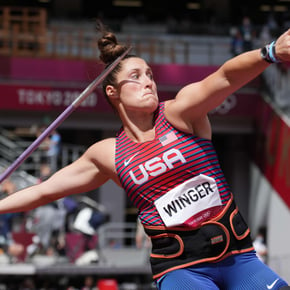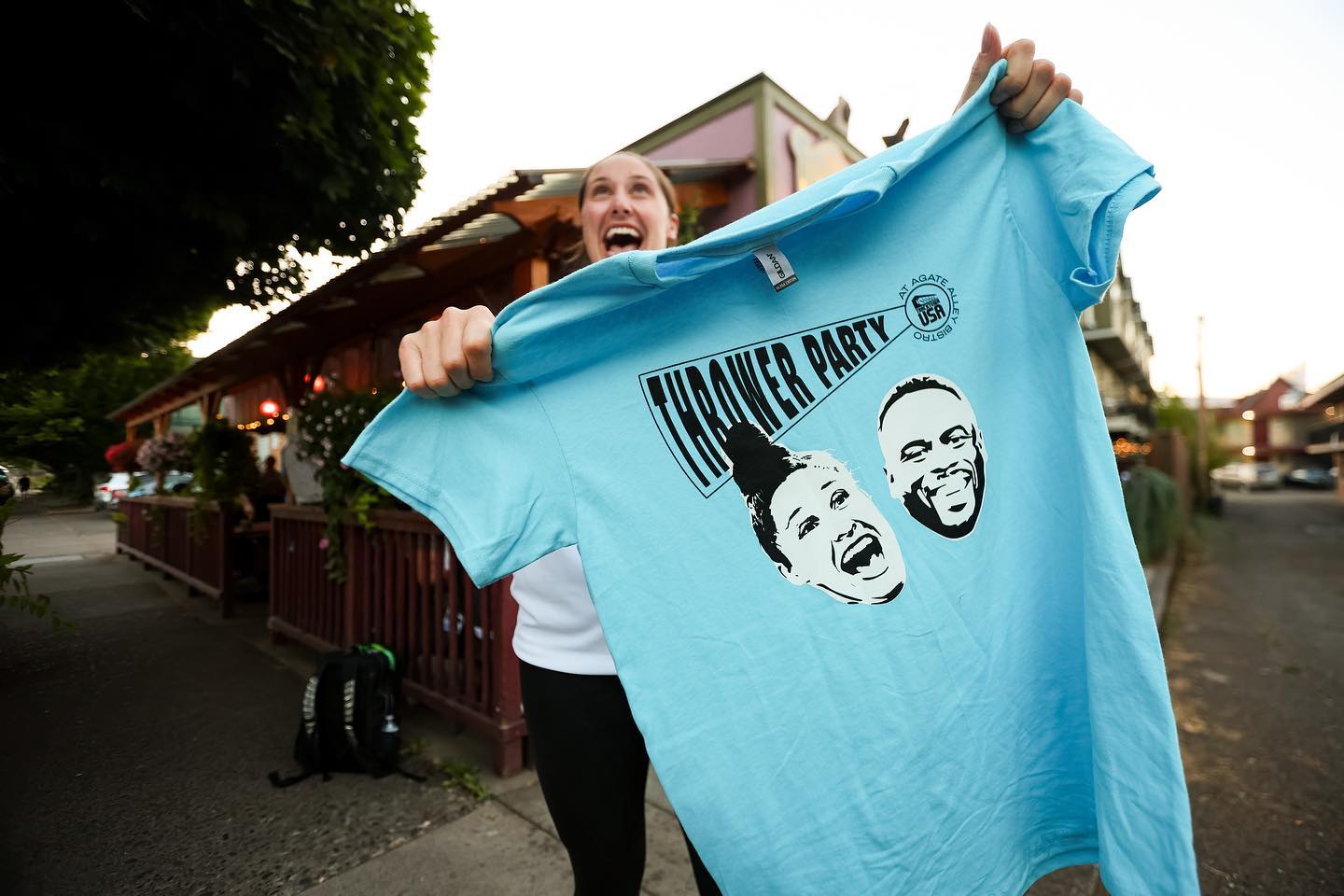
A note that this will all be based on my own learning. I did a lot of ignoring other peoples’ advice when I was approaching the years that I knew would be my last as a javelin thrower, because ✨ I still had time. ✨ While I’m incredibly proud of the way I finished my athletic career, I also know that I probably heard the things you’re about to read as I approached retirement, and willfully ignored all of them. I think that’s okay! An athletic career — even a twenty-year one — is so, so fleeting, so if you’re still in an active one, I am not offended if you don’t proceed to the words below. You do you, focus on the now, take every single moment as it comes because they are so precious. Sure, you should be investing, financially preparing for your future as best you can (because that truth is universal no matter your stage in life), but contrary to popular belief, I don’t think you need to rush into preparations for life after sport. This life is short but it’s also long: You’ve mastered the universe you’re in, so you’ll master the next one, too, I promise. Know that it’s out there, but do your thing while you can, as best you can.
But…I’m retired. So if you’ve recently made that move, too, maybe I can help you navigate it. We were athletes. What do we do now?
Step 1: Celebrate
My second ACL tear happened just shy of a year before what I’d planned would be my fourth and final Olympics (Tokyo). I made it, and I got more out of that final Games than I ever expected, even if it wasn’t a medal (or even a final). I was completely satisfied at that point with my career, but had decided in 2017 to make the first ever U.S.-soil Worlds my last: Eugene, Oregon in 2022. I went to therapy. I asked my husband to coach me so we could spend one more year together in sports after his retirement from the discus in 2016. I prepared as best I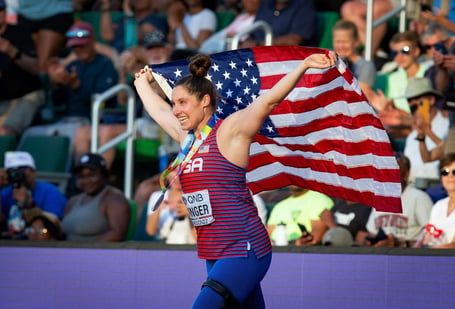 could to enjoy every moment of my self-determined final season. And I did everything I ever dreamed of doing, finally, at the buzzer. A ninth U.S. title. World Championships silver. First personal best in twelve seasons, which also happened to be a second career American Record. World Leader in distance thrown. Diamond League Final Champion. Ranked number 1 in the world overall, which held up for 43 weeks.
could to enjoy every moment of my self-determined final season. And I did everything I ever dreamed of doing, finally, at the buzzer. A ninth U.S. title. World Championships silver. First personal best in twelve seasons, which also happened to be a second career American Record. World Leader in distance thrown. Diamond League Final Champion. Ranked number 1 in the world overall, which held up for 43 weeks.
An absolute dream. But also a whirlwind of twenty years, capped by a hurricane of a final season, that I needed time to reflect on, drink champagne to, talk to my family about (I cried over lunch when I finally saw my parents again last fall), write the details of, and eat cake while pondering. I am wildly grateful for EVERY step it took to be an athlete for as long as I got to be one, and regardless of how you ended your career, you deserve time to unpack it. Did you do your best? That’s literally all you can do. So, if so (and I bet you did), raise a glass, take a vacation, have a spa day, throw a party, or all of that, as many times over as you need to to do your amazing journey justice. I give you permission to celebrate for the rest of your life. I plan to. What a ridiculously cool thing we got to do!
Step 1a: Or mourn... but celebrate
I’ve watched many friends leave sport dissatisfied. Bitter, even. And that’s also completely and utterly okay. We wouldn’t be athletes without expecting the best from ourselves, so it’s normal to feel all of the feelings of disappointment when things don’t go the way you thought they would. But I hope that, in time, you see how amazing you are, despite not achieving all the things you visualized, yearned for, prepared your best for, and didn’t ultimately get.
Seventy meters in the women’s javelin (almost 230 feet) is a magic number. Only five women in history have reached it. Only 12 (including myself 😃) have thrown 68m or more. I had giant aspirations of being one of the women beyond that massive 70m line, and establishing a new PB in 2022 at 36 years old after two block leg ACL surgical recoveries tells me that I absolutely did have the potential to throw that far. I just got hurt a lot. And it didn’t happen. After I threw 68.11m in my second-to-last meet ever, I understood that, yes, I had not met my ultimate potential. But I quickly also came to: I did the best I could with what I had. And I can totally live with a little missed opportunity ache behind this giant swell of pride. That mix of good and bad is what my career has always been…
After my best Olympic finish in Rio (the furthest ever mark to not make an Olympic final), my friend Susan sent me this: “How blessed we are to feel so deeply in both directions.” You, fellow retired woman athlete, were so brave to put your heart on the line in every competition you lined up for. When you get out here, beyond sport, you realize that not everyone takes that chance. The courage to stand on your own, believe completely in yourself and the abilities you’ve honed, and try, win or lose, in front of the world, is amazing. Celebrate that. And when you start there, you’ll see how much you loved each moment that wasn’t about results: Sharing physical suffering at practices with training partners, hilarious commiseration stories about long travel days over dinner with competitors, and getting drug tested during historic moments, remembering laughter under the stands while the stadium roared.
It’s okay to mourn. But then, please, also celebrate.
Step 2: Keep moving
I happened upon the knowledge that my body felt better without a true offseason. When I hurt my knee again in 2020, I couldn’t afford the time to stop moving. Went from competition to prehab to rehab to competition again, and the rest of my body felt great in 2021 after continuing to move throughout the fall, when I would have normally laid around for a month or so. I took that learning straight into the 2022 season and then retirement, and while it has taken almost a year for athlete weight to start leaving my body, I feel awesome.
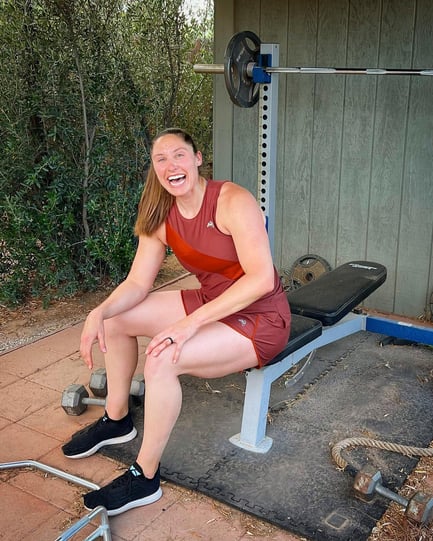 Everyone is different. But to keep tapping into who you were as an athlete, keep moving your body in ways that make you feel strong. A fun side effect of continuing familiarity with skills you’ve built is that, when everyone else starts competing again and you don’t, you’ll feel a tiny bit less fomo, knowing that if you reeeeeeally wanted to, you could jump back in. That might just be me. But it’s fun secret knowledge to have.
Everyone is different. But to keep tapping into who you were as an athlete, keep moving your body in ways that make you feel strong. A fun side effect of continuing familiarity with skills you’ve built is that, when everyone else starts competing again and you don’t, you’ll feel a tiny bit less fomo, knowing that if you reeeeeeally wanted to, you could jump back in. That might just be me. But it’s fun secret knowledge to have.
Highly recommend also trying new stuff! I should not, but you should. I played pickup basketball this year and immediately got bursitis — in my good knee. But if you’re not as injury-prone as me, go wild with the other sports! I’m simply running 5k’s, because of relative safety (I wear open-ear bluetooth headphones and do my best to not cross busy streets to be extra safe).
Being fit, strong, physically capable, etc. is what we’ve always known as athletes. Keep that constant for yourself, just explore it in ways you never had time or risk for as a pro! While running is SO hard, the confidence I gain in that exercise of willpower and cardiovascular endurance gives me life like catching a 100 kilo clean used to.
Step 3: Trust yourself... listen to your heart
Russ (my husband) has said to me a few times this year, “Just because you said you were retiring doesn’t mean you have to,” when I get the nerve to say out loud that I miss it. I’ve called my strength coach of 14 years to ask him to tell me, again, how hard it was. Because the way I ended my career means I’ll always remember the best times most readily. They’re freshest, sharpest, and most wonderful, and that makes it seem like I could do them all again, no problem! That is so untrue it’s laughable, but it’s still easy to believe when my perspective on my whole career is coated in the magic of 2022.
I’ve tried enough javelin-esque things since last fall to be sure I made the right choice for me. And if you also have a tendency to waffle on the big decision, I encourage you to try some of your sport-adjacent things. They’re not off-limits just because you said you wouldn’t compete anymore. So pick up your metaphorical implement and give it a go! See how your body feels. Test it out. And be honest with yourself about the results.
For me, I loved it again, immediately. Tapped into technique I know well, was able to make adjustments, made the javelin fly nice, felt connected. SO fun. But my body (specifically, left knee and pesky back) hurt just enough to put it back down and continue to be satisfied.
In the same way, listen to your heart when you’re attempting new endeavors. Have people from multiple walks of your life to bounce thoughts off of, confide in, and listen to feedback from, but mostly trust yourself. It can be really hard to know your worth in new scenarios, but you spent long enough learning it in athletics that your true feelings will come to you if you give them time to surface.
I’ve struggled to figure out why I’m frustrated in certain new, non-athlete roles, but continued to put consistent work in at them until I can actually voice what’s wrong. It’s the same as being handed a new training block by a coach, trusting the process and doing your best at it, then giving feedback at the end of the month to get a better outcome next time: Do your best, trust the structure around you, give everything some time, but know that you’re the ultimate champion of your own life. If you need something different from your new way of existing, prepare to have that conversation with bosses, loved ones, or whoever you need to, have it, and adapt when you get feedback.
You’re the only one who knows what you actually need. Trust yourself enough to know that, voice it, and move on if you see a future you don’t want in that role. But take your time in getting to the conversation stage: It took me most of this year to be able to critically think about a job, hobby, or anything else the way that I could self-evaluate my athletic career.
Applying athletics-learned skills to employment is super valuable, but also takes some practice. We can talk about that offline if you want. 😂 Or maybe that’s its own blog.
Step 4: Stay connected if it serves you
I was suffering this year. Pretty badly. Getting comfortable with my new way of life but, you know, not thriving.
It turns out that even if you go out on top, it’s still tough to adjust to non-athlete life.
And maybe the fact that I did go out on top meant the contrast of spending a week on the wild high of becoming number one in the world, then returning home to put new siding on the house felt that much more drastic. I never experienced Olympic blues, because my Olympics (entitled statement incoming) never felt like the dream I thought they would, but perhaps I finally had my own personal version of that in the way I retired. But also because I left at my true best, my sport will always be my happy place, which means that when I was suffering and had an opportunity this summer to return to it in a new way, I jumped at it.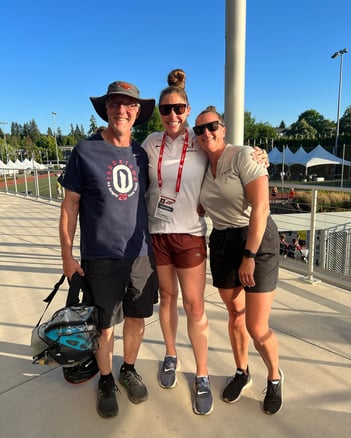 I emceed a javelin-only event at Fresno State. I webcasted for USATF at two different events. I hosted my first javelin clinic at Colorado State. And each time I got to be back in my world because I continued to foster relationships from that realm. I was just open to new ways of being involved in the sport, and when they came to me, my heart felt full again. And I got paid for my expertise. I keep thinking about that quote about tradespeople: “If I do a job in 30 minutes, it’s because I spent ten years learning how to do that job in 30 minutes. You owe me for the years, not the minutes.” I don’t necessarily think we’re owed anything. But if we, retired athletes, want to continue to be involved in our sports and have the skills to do so in new ways, of course our experience is valuable and worth investing in by the powers that be.
I emceed a javelin-only event at Fresno State. I webcasted for USATF at two different events. I hosted my first javelin clinic at Colorado State. And each time I got to be back in my world because I continued to foster relationships from that realm. I was just open to new ways of being involved in the sport, and when they came to me, my heart felt full again. And I got paid for my expertise. I keep thinking about that quote about tradespeople: “If I do a job in 30 minutes, it’s because I spent ten years learning how to do that job in 30 minutes. You owe me for the years, not the minutes.” I don’t necessarily think we’re owed anything. But if we, retired athletes, want to continue to be involved in our sports and have the skills to do so in new ways, of course our experience is valuable and worth investing in by the powers that be.
If you’re in that place of peace with your decision to be done being an athlete, but miss it all the same, try a new angle. Refresh your perspective on your sport by contributing to its universe in new ways. I felt massively better. You might, too.
Alternate Step 4, or Step 5: Find new mastery
Returning to your sport in any way though, can feel like a bandaid. We chose to leave, so leave, right? Like the above section states, I think you can manage to leave and still stay involved, but I also totally respect leaving it completely in the rearview mirror if that’s right for you.
Retired athletes were really, really, good at a set of skills in sport. That means that after sport, when I try new things, the discomfort of being bad is wildly jarring. I can almost always find humor in my general awkwardness, but still!
The other component of discomfort — and really a bigger mental health issue for me — is missing the part of my day that used to be set aside for being the best at something.
I absolutely loved the process. I think I was forced to, early and often, by injuries: When I had physical ability wrenched away from me by a surgery, the only way I survived was to focus hard on each day’s small victories. On the most challenging days, I had to find joy in just one rep, a single moment, or one tiny degree of change in a positive direction. That narrow focus through hard times taught me so well how to do the same things when my world got bigger in health, and celebrate all of the stages that get us as athletes to where we know we can go. I remember each step on the trail up the mountains I had to climb, and eventually, because I’d navigated similar trails so many times before, seeing a switchback that I knew would lead me up to a peak became its own victory, even when I knew there was a lot of scrambling still ahead.
Training for the javelin was my sanctuary. I knew exactly who I was, what I was doing, and how to do it extremely well in those two-ish hours per day. Retiring means that place of mastery disappeared overnight. As someone who struggles a bit with upholding boundaries, I’m having a hard time carving out similar time for myself each 24-hour period. Why wouldn’t I let other things creep into the space I always considered “me” time? I don’t have anything to do during that time now, anyway.
Let’s be brave enough to begin again.
When I’ve protected my former practice time by exercising during it, I feel 10x better than when I don’t take the break and simply keep working. I haven’t found the thing I might feel mastery over next yet, but I’m giving myself grace and time to find it. I love playing the piano, but haven’t prioritized it at all since retirement: Maybe writing this piece is the accountability I need. What I know about myself (and maybe you’re the same) is that it just takes a few intentional first steps to fall into the familiar focus of learning, bettering, and loving a skill. The first few reps of any drill were always just to get comfortable, 4-9 felt like butter, and the tenth was mostly for good measure. On those magical days when you feel most strong though, reps 2-10 are all solid, connected, the best in the world.
Retirement, even though I’ve been in it for a year, is new and scary, but also full of possibilities.
Take your time to be sure you’re ready to move on, and in which direction. Know that you’re not alone - and voice it if you start to feel that way (you are so not alone if you break down sometimes, let me tell you personally). You’ve always been the master of your universe, so find new ways to continue to be your own champion. Maybe you’ve also gotten this question incessantly: “What’s next?!” The answer is, whatever you want, on your own terms and in your own time.
P.S. My answer to the “What’s next?!” question has been, in an employment sense, that I was all set. I worked for Parity full-time for the final two seasons of my career, and the gift of consistent employment in this first year of retirement has kept on giving. Having two years to adjust to employee life and serving my fellow athletes in this role while I continued to compete was a fantastic move for me personally. The stability I stayed in upon retirement from sport has served me really well, and if you are an active athlete struggling to make ends meet and can find a similar remote work scenario that you have the capacity for, I highly recommend the diversification of your skills in that way. We at Parity don’t want athletes to have to also work to compete, but if you’re someone who wants to like I was, take it from me that it can propel you to higher heights, and provide a safe place to retire from sport to.
About Parity
Minority-founded in 2020, Parity's mission is to close the gender income and opportunity gap in professional sports. By developing high-impact collaborations between brands, professional women athletes and their fans, Parity has proudly put more than $2 million in the pockets of women athletes, attracting dozens of brands to the movement in the process. The platform offers connections to more than 850 women athletes from 70+ sports, including well over 200 Olympians and Paralympians. For more information on how to tap into the rapidly rising influence and popularity of women athletes, visit https://paritynow.co or follow us on Instagram, LinkedIn, Facebook, X (formerly Twitter) and Threads.
